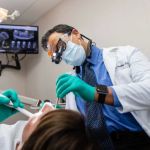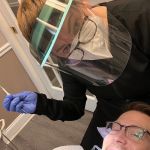How I Learned to Protect My Teeth from Grinding While I Sleep
It wasn’t until I visited my dentist for a routine checkup that I discovered I was grinding my teeth at night. I had been experiencing frequent headaches, jaw pain, and tooth sensitivity, but I hadn’t made the connection to bruxism (the technical term for teeth grinding). My dentist informed me that grinding my teeth while I slept was the likely culprit. Since then, I’ve learned several effective ways to protect my teeth from grinding and to prevent further damage. In this article, I’ll share my personal experience and provide tips on how you can protect your teeth from grinding while you sleep.
1. Understanding Teeth Grinding (Bruxism) and Its Causes
Before diving into the solutions, it’s important to understand what bruxism is and why it happens. Bruxism is the involuntary grinding or clenching of teeth, usually during sleep. It’s often a response to stress, anxiety, or misalignment of the teeth. In some cases, it can also be caused by an abnormal bite, missing or crooked teeth, or even sleep disorders like sleep apnea.
I was surprised to learn that bruxism is quite common, affecting around 8-10% of adults. In my case, stress and anxiety seemed to be the main triggers for my teeth grinding. I had been going through a particularly stressful time at work, and my dentist suggested that my nighttime grinding was likely a subconscious response to that stress.
Tip: If you’re experiencing symptoms like jaw pain, headaches, or tooth sensitivity, it’s important to visit your dentist. Bruxism is often a silent problem that you may not be aware of until the damage starts to show.
2. The Damaging Effects of Teeth Grinding
When I first learned that I had been grinding my teeth, I was shocked by the potential damage I was causing. Over time, teeth grinding can lead to a number of issues, including:
- Worn-down teeth: Constant grinding can wear down the enamel of your teeth, leading to sensitivity and an increased risk of cavities.
- Jaw pain and tension: Grinding can strain the muscles and joints in your jaw, leading to discomfort and even temporomandibular joint (TMJ) disorder.
- Headaches: I noticed that my headaches, especially in the morning, were often linked to my teeth grinding at night. Bruxism can cause tension headaches due to the clenching of the jaw muscles.
- Cracked or chipped teeth: In severe cases, bruxism can cause teeth to crack or break, which may require restorative dental work such as crowns or fillings.
Tip: If you notice any of these symptoms, it’s crucial to seek treatment early. The longer bruxism goes untreated, the more damage it can cause to your teeth and jaw.
3. How I Began Protecting My Teeth from Grinding
Once I understood the severity of the problem, I started looking for ways to protect my teeth and reduce my grinding. Here are some of the steps I took that made a big difference:
- Custom-Fitted Night Guard: My dentist recommended wearing a night guard to protect my teeth from the effects of grinding. A night guard is a soft, custom-molded appliance that fits over my teeth, preventing direct contact between them while I sleep. Since I started wearing it, my headaches and tooth sensitivity have significantly decreased.
- Reducing Stress: I realized that stress was one of my main triggers for bruxism. To combat this, I started practicing relaxation techniques before bed, such as deep breathing exercises and meditation. This has helped reduce the frequency of my teeth grinding and improved my overall well-being.
- Improving Sleep Hygiene: I also noticed that my bruxism was worse when I wasn’t getting enough rest. So, I made sleep a priority by sticking to a regular sleep schedule and creating a calming bedtime routine to ensure better quality sleep.
- Jaw Exercises: My dentist suggested doing jaw exercises to help relax the muscles and reduce the tension caused by grinding. These exercises have been incredibly helpful in reducing my jaw pain and discomfort.
Tip: A night guard is one of the most effective ways to protect your teeth from the damage caused by grinding. Consult with your dentist to see if a custom night guard is the right option for you.
4. Additional Tips for Preventing Teeth Grinding
In addition to the steps I took, there are other habits and lifestyle changes that can help prevent bruxism:
- Avoiding caffeine and alcohol before bed: Both caffeine and alcohol can increase the likelihood of teeth grinding. I started limiting my intake of these substances, especially in the evening, to help relax my muscles and prevent nighttime grinding.
- Addressing misaligned teeth: If misalignment of your teeth or jaw is contributing to your bruxism, your dentist may recommend orthodontic treatment, such as braces or aligners, to correct the issue.
- Seeking therapy for anxiety: Since stress and anxiety were major triggers for me, I sought help from a therapist. Cognitive behavioral therapy (CBT) and other anxiety-reduction techniques helped me manage stress more effectively, which in turn reduced my grinding.
Tip: If you’re experiencing bruxism, consider evaluating your lifestyle for stressors that might be contributing to the problem. Managing stress can make a big difference in reducing teeth grinding.
5. When to See Your Dentist About Teeth Grinding
If you suspect that you’re grinding your teeth at night, it’s important to see your dentist for a professional evaluation. They can examine your teeth for signs of wear, check your jaw alignment, and help determine the best course of action to protect your oral health. Early intervention is crucial to prevent further damage and avoid more extensive dental work later on.
Tip: If you’re already experiencing symptoms like jaw pain, headaches, or tooth sensitivity, don’t wait—schedule an appointment with your dentist as soon as possible.







 Sugar Hill Family Dental4.0 (83 review)
Sugar Hill Family Dental4.0 (83 review) Cazes Family Dentistry LLC4.0 (61 review)
Cazes Family Dentistry LLC4.0 (61 review) Omega Dental Care4.0 (74 review)
Omega Dental Care4.0 (74 review) Dr. Stephen M. Buchanan, DDS3.0 (10 review)
Dr. Stephen M. Buchanan, DDS3.0 (10 review) Samson Wahl & Associates5.0 (6 review)
Samson Wahl & Associates5.0 (6 review) Fair Lawn Periodontics & Dental Implants4.0 (191 review)
Fair Lawn Periodontics & Dental Implants4.0 (191 review) The Importance of Oral Health Education During Pregnancy for a Healthy Pregnancy
The Importance of Oral Health Education During Pregnancy for a Healthy Pregnancy Best Tips for Brushing Your Teeth Properly for Healthy Gums: Essential Techniques for Oral Health
Best Tips for Brushing Your Teeth Properly for Healthy Gums: Essential Techniques for Oral Health Why Skipping Dental Checkups Can Lead to Bigger Oral Health Problems
Why Skipping Dental Checkups Can Lead to Bigger Oral Health Problems Advantages of Porcelain Dental Restorations
Advantages of Porcelain Dental Restorations How Can Diabetes Cause Tooth and Gum Problems? Preventing and Managing Oral Health Issues
How Can Diabetes Cause Tooth and Gum Problems? Preventing and Managing Oral Health Issues Healthy Habits for Promoting Good Oral Health and Hygiene: Tips for a Healthy Smile
Healthy Habits for Promoting Good Oral Health and Hygiene: Tips for a Healthy Smile